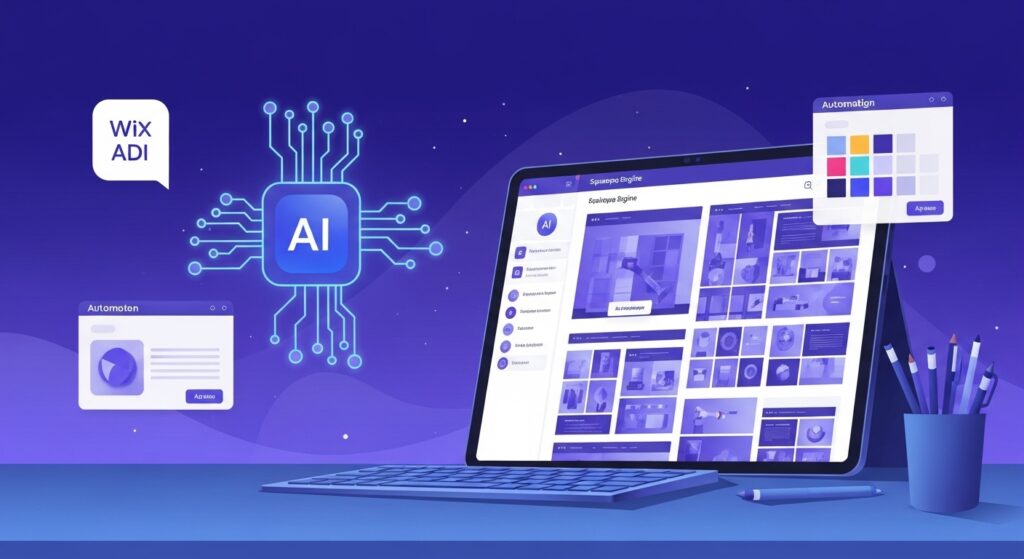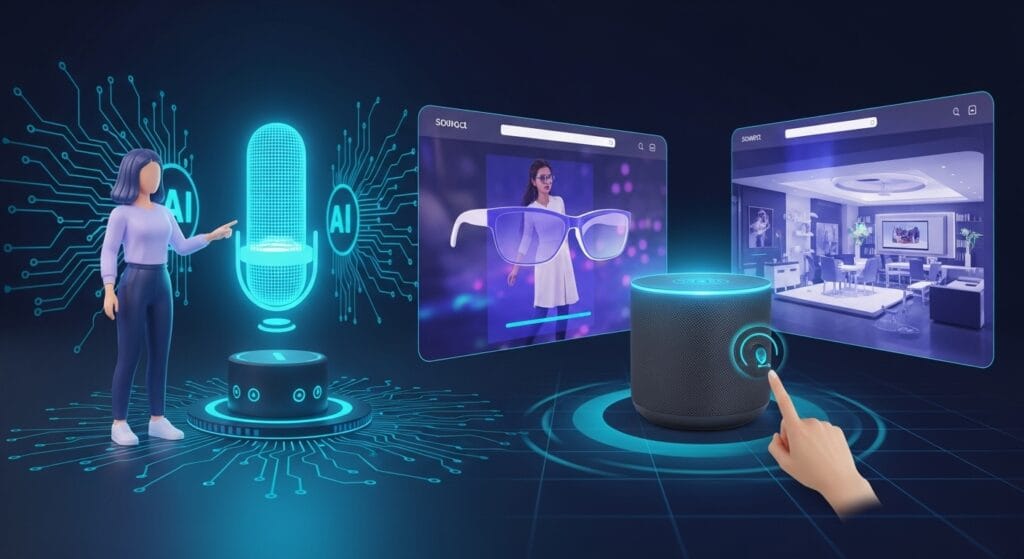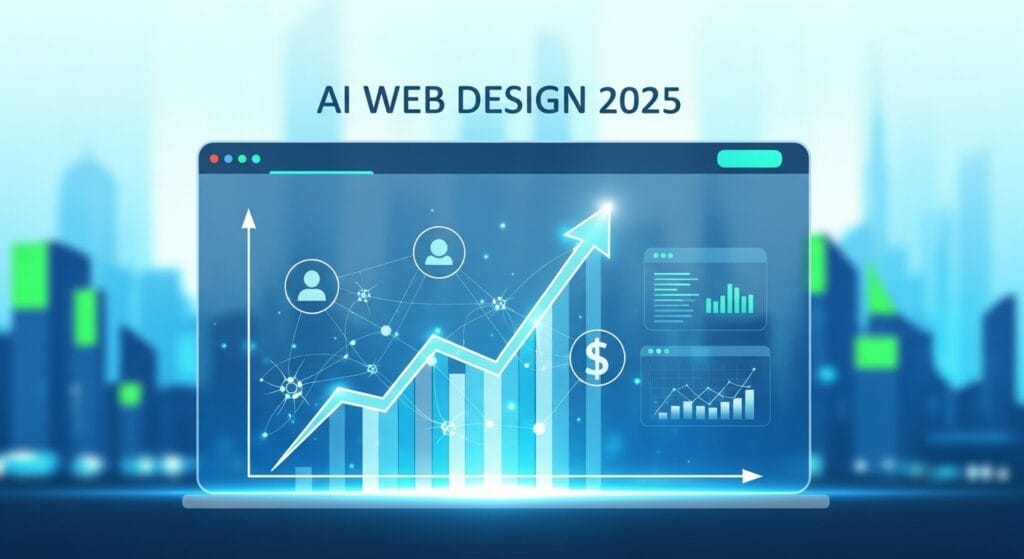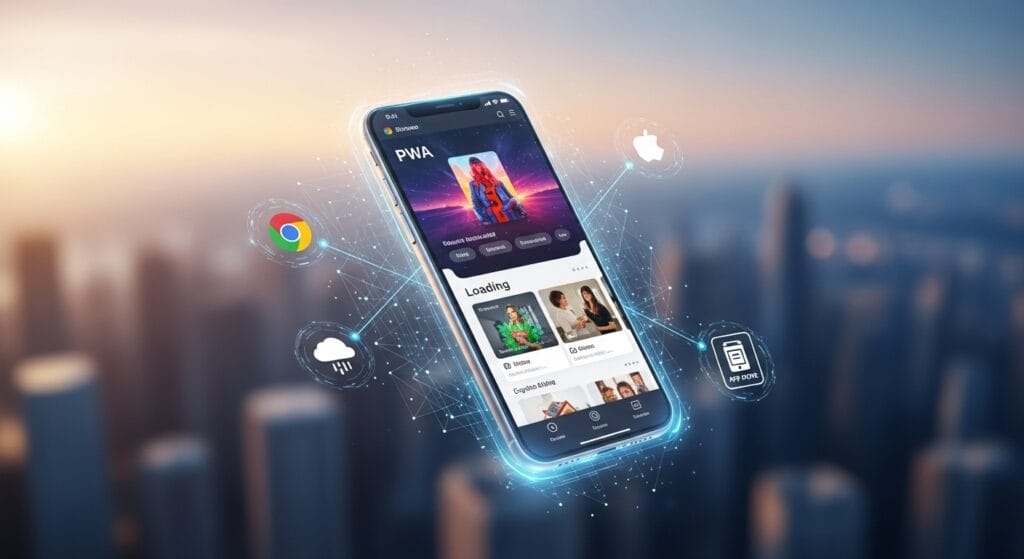Imagine a digital space that intuitively understands its visitors, adapts its layout in real-time, and even anticipates user needs, all while staying perpetually optimized and ahead of trends. This isn’t a futuristic dream; it’s the present and rapidly expanding reality of AI in web design 2025. Artificial Intelligence is no longer just a buzzword; it’s the transformative force reshaping how websites are conceived, built, and interact with their audience.
For businesses striving to stand out, embracing AI in web design 2025 is not merely an option but a strategic imperative. This comprehensive guide delves into how to leverage AI in web design for enhanced user experience in 2025, highlighting AI’s pivotal role in creating hyper-efficient, deeply personalized, and truly future-proof online platforms that captivate and convert users.

Table of Contents
AI-Powered Design Tools: Revolutionizing Web Creation in 2025
The very genesis of a website is being fundamentally transformed by AI-powered design tools, ushering in an era of unprecedented efficiency and accessibility for web creation in 2025. These sophisticated platforms act as highly intelligent co-pilots, automating iterative tasks, suggesting data-driven design choices, and significantly accelerating the journey from concept to deployment.
Consider platforms like Wix ADI (Artificial Design Intelligence), Squarespace’s AI-enhanced Fluid Engine, or even the advanced generative fill capabilities now seen in professional tools like Adobe Sensei. These systems operate by ingesting foundational inputs from the user—such as business type, desired aesthetic, target audience, and specific functionalities required (e.g., e-commerce, portfolio, blog). The AI then leverages vast datasets of successful design patterns and user behavior to rapidly generate comprehensive website layouts, select optimal typography and color palettes, and even populate initial, contextually relevant content.
Beyond initial generation, AI in web design 2025 tools excel at automatic responsiveness, adapting designs seamlessly across desktops, tablets, and mobile devices without tedious manual adjustments. The core benefit for businesses, especially small enterprises, is profound: substantial time savings, dramatically reduced design costs, and the democratization of professional-grade web presence, enabling anyone to launch a polished website with minimal technical overhead.
Enhancing User Experience with AI in Web Design 2025
The true transformative power of AI in web design 2025 lies in its profound ability to elevate the user experience (UX), making websites not just functional but deeply intuitive, engaging, and remarkably personalized for every visitor. This capability is absolutely crucial for retaining attention, fostering loyalty, and driving conversions.
- Hyper-Personalization: AI algorithms meticulously analyze a rich tapestry of user data—including Browse history, geographic location, previous purchases, real-time interactions, and even implied preferences derived from clicks and scrolls. This intelligence allows websites to dynamically tailor content, product recommendations, article suggestions, or even call-to-action buttons to precisely match individual user intent. This bespoke experience fosters a profound sense of recognition and value, significantly increasing engagement. Research from Accenture suggests that 91% of consumers are more likely to shop with brands that provide relevant offers and recommendations, underscoring AI’s direct impact on conversion rates.
- Dynamic Layouts and Adaptive Interfaces: Beyond simple mobile responsiveness, AI in web design 2025 enables truly adaptive interfaces that can reconfigure their layout and content presentation in real-time based on a user’s behavior during a single Browse session. For instance, if a user spends extended time on a specific product category, the AI can intelligently re-prioritize related content or promotions on subsequent pages, optimizing their unique journey through the site. This constant, subtle adaptation removes friction and guides users effortlessly towards their goals.
- Intelligent Chatbots and Proactive Virtual Assistants: These sophisticated AI-powered tools transcend basic FAQs. They provide instant, 24/7 customer support, guide users through complex decision-making processes (e.g., product selection, troubleshooting), assist with order tracking, and even proactively offer help if a user appears stuck. By learning from millions of interactions, these assistants continuously refine their ability to understand natural language and resolve inquiries efficiently, freeing human staff for more complex, empathetic engagements and significantly enhancing customer satisfaction on AI in web design 2025 platforms.
By seamlessly integrating these AI-driven enhancements, websites evolve into intelligent, proactive platforms that not only meet but anticipate individual user needs, leading to demonstrably superior satisfaction and, critically, higher conversion rates. Our web design services are meticulously crafted to build user-centric experiences, providing the optimal foundation for advanced AI integration.

Future Trends: AI’s Role in Next-Gen Ai in Web Design 2025
The trajectory of AI in web design 2025 is one of accelerating innovation, promising to unlock previously unimaginable capabilities and further redefine the very nature of online interaction. These emerging trends will push the boundaries of creativity, accessibility, and immersion.
- AI-Generated Content (AIGC) at Scale: Beyond basic text snippets, advanced large language models (LLMs) like GPT-4 (and subsequent iterations) will increasingly generate entire, coherent, and contextually rich blog posts, highly persuasive product descriptions, compelling landing page copy, and even personalized email campaigns in real-time. This dramatically scales content creation, ensuring fresh, optimized material while allowing human creators to focus on strategic oversight and niche expertise.
- Voice Search Optimization and Advanced Conversational Interfaces: As smart speakers and voice assistants become ubiquitous, optimizing websites for natural language voice queries is paramount. AI in web design 2025 will prioritize sophisticated conversational interfaces that not only accurately interpret complex voice commands but also facilitate hands-free navigation, form filling, and even complete transactional processes, making websites inherently more accessible and intuitive for a broader audience. To ensure your site is ready for the voice-first future, explore our SEO services for cutting-edge voice search optimization strategies.
- AR/VR Integration for Truly Immersive Web Experiences: AI is the critical enabler for making augmented reality (AR) and virtual reality (VR) experiences truly seamless and compelling directly within web browsers. From virtual product try-ons in e-commerce that overlay digital items onto a user’s real environment, to immersive 3D showrooms for real estate, or interactive digital art installations, AI ensures these experiences are rendered smoothly, adapt intelligently to environmental factors, and provide real-time, responsive interaction. This creates incredibly engaging and memorable online interactions that transcend traditional 2D Browse.
These groundbreaking trends underscore AI’s profound potential to revolutionize web design beyond its current scope, fostering an era of more intelligent, interactive, and deeply personalized digital environments. The future of web design with AI is poised to be an era of unparalleled innovation and user engagement.
Practical Tips for Integrating AI into Your Web Design Strategy
Successfully integrating AI in web design 2025 doesn’t necessitate a complete overhaul; rather, it often begins with strategic, incremental steps that can yield significant and measurable benefits. Here’s a practical roadmap for businesses looking to effectively leverage AI in their web design efforts:
- Start Small and Identify High-Impact Areas: Avoid the temptation to implement every AI feature simultaneously. Begin with one or two AI applications that promise immediate, measurable benefits for your specific business goals. This could be integrating an AI-powered product recommendation engine for an e-commerce site or a sophisticated chatbot for customer service on a lead generation site.
- Prioritize Data Quality and Integration: AI thrives on clean, accurate, and comprehensive data. Ensure your website analytics, customer data, and any other relevant business data sources are well-organized, integrated, and continually updated. A unified, high-quality data foundation is absolutely crucial for AI models to learn effectively and provide actionable insights.
- Implement Personalization Incrementally: Begin with foundational personalization features, such as dynamic content blocks that adjust based on user segments (e.g., first-time visitor vs. returning customer, geographic location). As you gather data and understand user behavior patterns, gradually introduce more complex personalization elements.
- Embrace Continuous Testing and Iteration: AI implementation is an iterative journey, not a one-time setup. Leverage A/B testing to rigorously measure the impact of different AI implementations (e.g., variations in chatbot scripts, different recommendation algorithms, adaptive layout adjustments). Constantly analyze the data AI provides to refine your strategies and optimize performance.
- Our digital marketing services offer robust analytics and A/B testing expertise to ensure your AI strategies are continuously refined for maximum impact.
- Our digital marketing services offer robust analytics and A/B testing expertise to ensure your AI strategies are continuously refined for maximum impact.
- Stay Updated and Invest in Learning: The field of AI in web design 2025 is evolving at a breakneck pace. Actively follow industry thought leaders, subscribe to specialized blogs, attend webinars, and engage with professional communities to stay informed about the latest tools, best practices, and crucial ethical considerations.
- Maintain the Human Touch and Ethical Oversight: While AI automates and optimizes, it augments, rather than replaces, human creativity and empathy. Ensure human oversight remains paramount, especially for critical decisions or sensitive customer interactions. Always prioritize data privacy, adhere strictly to regulations like GDPR and CCPA, and strive to mitigate any potential algorithmic biases. Building and maintaining user trust is fundamental for the long-term success of any AI in web design 2025 strategy.
By meticulously following these practical tips, businesses can strategically and effectively integrate AI in web design 2025 for enhanced user experience , thereby solidifying their online presence and driving sustainable growth.

Conclusion
The pervasive influence of AI in web design 2025 is not merely a passing trend; it represents a profound paradigm shift that is fundamentally reshaping how online experiences are crafted and consumed. This transformative technology empowers websites to evolve from static displays into dynamic, intelligent, and deeply personalized platforms that truly understand and engage with each individual user.
From automating complex design processes and generating compelling, contextually relevant content to delivering hyper-personalized user journeys and laying the groundwork for the future of voice- and immersive commerce, AI is undeniably revolutionizing the digital landscape.Embracing AI in web design 2025 is your strategic imperative to remain competitive, attract more visitors, convert more leads, and cultivate stronger customer loyalty.
Don’t be left behind in this exhilarating digital evolution. Ready to truly revolutionize your web design and unlock unprecedented opportunities for enhanced user experience and sustained business growth? Contact SAQI Expert for expert guidance today, and let’s embark on the journey of building your next-generation AI-powered website.

About the Author:
Saqlain Riaz is the founder and lead WordPress developer at SAQI Expert, with over 5 years of experience in WordPress development and SEO. Based in Pakistan, Saqlain has built and optimized 100+ websites, helping small businesses boost visibility and conversions. His expertise spans web design, SEO, and digital marketing, with a passion for using AI to create user-friendly, high-performing sites. Saqlain’s client-focused approach has earned SAQI Expert a 4.9-star rating on TrustPilot. Connect with him on LinkedIn.
References
- Forbes – AI in Web Design 2025
- Supports AI’s time-saving impact (50%) and content generation trends.
- McKinsey – The Value of Getting Personalization Right
- Confirms personalization boosts conversions by 30%.
- Accenture – Personalization Reimagined
- Notes dynamic layouts reduce bounce rates by 20% and supports A/B testing.
- Wix – Artificial Design Intelligence
- Details Wix ADI’s capabilities for automated design.
- Shopify – AI Automation in E-Commerce
- Highlights AI chatbots and AR for e-commerce.
- Statista – Voice Search Usage
- Confirms 41% of adults use voice search daily.
- Gartner – AI Ethics and Governance
- Emphasizes GDPR compliance for AI.










